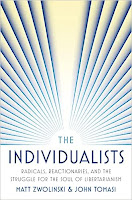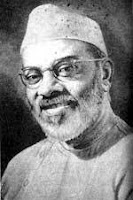Matt
Zwolinski and John Tomasi have contributed an excellent history of libertarian
ideas in their recently published book, The Individualists. The question
I pose for myself is related to the subtitle of the book: “Radicals,
Reactionaries, and the Struggle for the Soul of Libertarianism”.
The reason Zwolinski and Tomasi refer to individualists rather
than to libertarians in the main title is presumably because they believe that
a commitment to “individualism is at the core of libertarianism”. They also
note that many of the most intellectually active friends of liberty in Britain
were known as individualists before the term libertarian caught on.
Synopsis
Zwolinski and Tomasi identify six markers which form the core
of a libertarian world view: private property, skepticism of authority, free
markets, spontaneous order, individualism, and negative liberty. They observe
that while libertarians don’t necessarily view those principles as absolutes,
they typically see them “as a tightly integrated system of thought, with each
commitment being supported by, and lending support to, the others”.
After providing a historical overview, the book discusses
the history of radical and reactionary libertarian ideas relating to private
property, libertarian anarchism, big business and free markets, poverty and
spontaneous order, racial justice and individualism, and global justice and
noninterventionism. Much of this information was familiar but I was surprised about
how much was new to me.
Zwolinski
and Tomasi’s final chapter focuses largely on the battle between bleeding heart
libertarians, left libertarians and paleolibertarians for control of the
libertarian party in the United States. The authors conclude that
libertarianism is “intrinsically a diverse ideology”, and that “the struggle
between libertarianism’s progressive and conservative tendencies, a struggle
for the soul of libertarianism, is likely to go on”.
That may be
an appropriate way to end a history of ideas directed to an audience composed
largely of people who live in the USA. As a person who doesn’t fit into that
category, however, I am concerned that describing differences of opinion as “a struggle
for the soul of libertarianism” may generate more heat than light. As I see it,
libertarians should be encouraged to acknowledge good ideas whether they are
espoused by conservative or progressive libertarians. I would have preferred to
see the book end by acknowledging that libertarians are engaged in an ongoing
struggle against authoritarianism as people on opposing sides of the culture
wars seek to enlist the coercive powers of the state to pursue their interests.
More
fundamentally, the struggle the authors describe - about which set of political
prescriptions will come to be most closely identified with the ideology – seems
to me to be conducted without much reference to the soul, or essence, of libertarianism.
The book left me wanting to promote the view that the soul, or essence, of
libertarianism stems from the nature of human flourishing. Zwolinski and Tomasi
may have good reasons for not exploring that idea more fully in their book, but
it seems to me to be an idea that deserves to be given more attention.
The soul
of libertarianism
In my view,
the passage from Wilhelm von Humboldt quoted at the beginning of this review comes
close to capturing the soul of libertarianism. Liberty is the best
principle for the coexistence of humans because it offers conditions most favourable
to self-directed individual flourishing.
Humboldt’s
contributions influenced John Stuart Mill in writing On Liberty. They
were also acknowledged by Friedrich Hayek in the conclusion of the chapter of The
Constitution of Liberty discussing education and research:
“And we
cannot think of better words to conclude than those of Wilhelm von Humboldt
which a hundred years ago John Stuart Mill put in front of his essay On
Liberty: ‘The grand, the leading principle, towards which every argument
unfolded in these pages directly converges, is the absolute and essential
importance of human development in its richest diversity’.”
Readers who
are eager to know more about Humboldt will find an online article by George H
Smith published on libertarianism.org to be of interest.
The discussion of egoism in The
Individualists is relevant to considering the link between liberty and
individual flourishing. Zwolinski and Tomasi note that in the 19th
century American libertarians, such as Benjamin Tucker, were influenced by Max
Stirner, a German theorist, who held that the only standard or right was the
ability to transform one’s will into action. That view is in stark contrast to
the ethical egoism advocated by Ayn Rand and her followers during the 20th
century. Rand denied that might makes right and argued that egoism is
compatible with recognition of universal natural rights.
The link
between liberty and individual flourishing is recognized today in the writings
of some classical liberal and libertarian authors. Doug Rasmussen and Doug Den
Uyl deserve special mention because they have developed related ideas
rigorously in their trilogy of books: Norms of Liberty, The Perfectionist
Turn, and The Realist Turn.
Readers
looking for a non-technical introduction to these ideas may find relevant
discussion in various places including an article by Ed Younkins on The Savvy Street,
and in my book, Freedom, Progress, and Human Flourishing. Rasmussen and Den Uyl have provided a
summary of their views in Chapter 2 of The Realist Turn. A quote from
the conclusion of that chapter will convey the essence of their understanding
of the role of liberty in the context of human flourishing.
“In essence, natural rights represent a realization of
certain normative requirements that are inherent in the individualized nature
of human flourishing within a social context. In particular, when thinking
about rights, we are concerned with the conditions that must be secured for the
individualized nature of flourishing to function. Although liberty is the key
term in this context, we regard it not as the central concept for flourishing
generally, but only with regard to setting the social context for flourishing.
And although we reject constructivism as a foundational principle, we recognize
the role of social constructs within the constraints provided by a framework of
natural rights. As such, our theory is not about the whole of political and
social life, but about the political/legal structure within which such life
should and must be allowed to function if flourishing is our standard.”
Conclusions
My reading of The Individualists by Matt Zwolinski and John Tomasi has prompted me to present a view
about the soul of libertarianism. Zwolinski and Tomasi end their excellent
history of libertarian ideas by suggesting that progressive and conservative
factions within libertarianism will continue to struggle over the soul of
libertarianism. I put the view that the soul, or essence, of libertarianism
stems from the nature of human flourishing. Wilhelm von Humboldt came close to
capturing the soul of libertarianism 230 years ago when he suggested: “The
highest ideal … of the co-existence of human beings seems to me to consist in
a union in which each strives to develop himself from his own innermost
nature, and for his own sake”. The
link between liberty and individual flourishing has been recognized by many
libertarians and classical liberals, and is rigorously explained in the writings
of Doug Rasmussen and Doug Den Uyl.
References
Bates,
Winton, Freedom, Progress, and Human Flourishing, Hamilton Books, 2021.
Den Uyl,
Douglas J., and Douglas B Rasmussen, The Perfectionist
Turn: From metanorms to metaethics, Edinburgh University
Press, 2016.
Rasmussen,
Douglas B., and Den Uyl, Douglas J, Norms of Liberty,
Pennsylvania State University Press, 2005.
Rasmussen,
Douglas B., and Den Uyl, Douglas J, The Realist Turn,
Palgrave Macmillan, 2020.
Smith, George
H., ‘The Culture of Liberty: Wilhelm von Humboldt’, libertarianism.org,
2013.
Younkins,
Edward W., ‘Rasmussen and Den Uyl’s Trilogy of Freedom and Flourishing’,
The Savvy Street, 2021.













